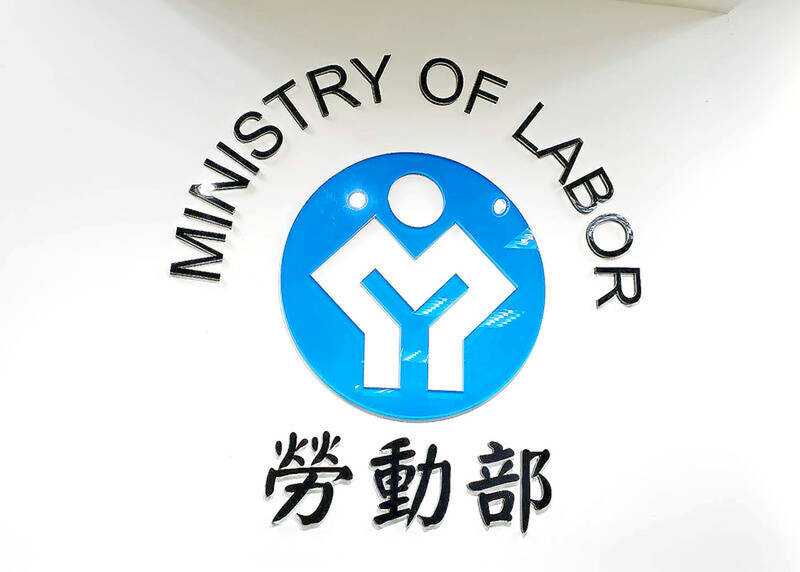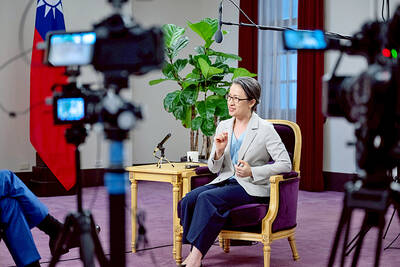The Ministry of Labor on Thursday said it is planning to open the social-work sector to foreign nationals following the passage of a regulatory amendment.
Workforce Development Agency officials said that foreign nationals would be allowed to seek white-collar job opportunities in the social-work sector after passing Taiwan’s national examinations.
However, foreign nationals would only be able to seek employment with public social welfare, labor, judicial and health organizations, or private registered groups, the officials said.

Photo: Lee Ching-hui, Taipei Times
International students are already allowed to major in social welfare at a higher-education institution in Taiwan, but regulations restrict their employment opportunities in the field domestically even after graduating and obtaining national certification, the officials said, adding that the issue was brought to the ministry’s attention by the Ministry of Health and Welfare.
Social Assistance and Social Work Department head Su Chao-ju (蘇昭如) said that the department received a letter from a foreign resident who was unable to seek employment in the social work sector in Taiwan even after passing the certification examination.
After seeking input from the labor ministry and domestic social work organizations, and factoring in the potential effect on employment of Taiwanese, the health ministry deemed it appropriate to recommend permitting foreign nationals to work in the sector, Su said.
The recommendation also came after realizing the level of professionalism among prospective foreign social workers after passing the nation’s exams, Su said, adding that such talent could contribute to social work in Taiwan’s diverse communities and expat groups.
National Union of Licensed Social Workers chairwoman Wu Yu-chin (吳玉琴) said that her union welcomes the inclusion of foreign nationals in the social worker sector.

China might accelerate its strategic actions toward Taiwan, the South China Sea and across the first island chain, after the US officially entered a military conflict with Iran, as Beijing would perceive Washington as incapable of fighting a two-front war, a military expert said yesterday. The US’ ongoing conflict with Iran is not merely an act of retaliation or a “delaying tactic,” but a strategic military campaign aimed at dismantling Tehran’s nuclear capabilities and reshaping the regional order in the Middle East, said National Defense University distinguished adjunct lecturer Holmes Liao (廖宏祥), former McDonnell Douglas Aerospace representative in Taiwan. If

TO BE APPEALED: The environment ministry said coal reduction goals had to be reached within two months, which was against the principle of legitimate expectation The Taipei High Administrative Court on Thursday ruled in favor of the Taichung Environmental Protection Bureau in its administrative litigation against the Ministry of Environment for the rescission of a NT$18 million fine (US$609,570) imposed by the bureau on the Taichung Power Plant in 2019 for alleged excess coal power generation. The bureau in November 2019 revised what it said was a “slip of the pen” in the text of the operating permit granted to the plant — which is run by Taiwan Power Co (Taipower) — in October 2017. The permit originally read: “reduce coal use by 40 percent from Jan.

‘SPEY’ REACTION: Beijing said its Eastern Theater Command ‘organized troops to monitor and guard the entire process’ of a Taiwan Strait transit China sent 74 warplanes toward Taiwan between late Thursday and early yesterday, 61 of which crossed the median line in the Taiwan Strait. It was not clear why so many planes were scrambled, said the Ministry of National Defense, which tabulated the flights. The aircraft were sent in two separate tranches, the ministry said. The Ministry of Foreign Affairs on Thursday “confirmed and welcomed” a transit by the British Royal Navy’s HMS Spey, a River-class offshore patrol vessel, through the Taiwan Strait a day earlier. The ship’s transit “once again [reaffirmed the Strait’s] status as international waters,” the foreign ministry said. “Such transits by

Taiwan is doing everything it can to prevent a military conflict with China, including building up asymmetric defense capabilities and fortifying public resilience, Vice President Hsiao Bi-khim (蕭美琴) said in a recent interview. “Everything we are doing is to prevent a conflict from happening, whether it is 2027 or before that or beyond that,” Hsiao told American podcaster Shawn Ryan of the Shawn Ryan Show. She was referring to a timeline cited by several US military and intelligence officials, who said Chinese President Xi Jinping (習近平) had instructed the Chinese People’s Liberation Army to be ready to take military action against Taiwan